The Samsung Galaxy S6 and S6 edge Review
by Joshua Ho on April 17, 2015 9:00 AM EST- Posted in
- Smartphones
- Samsung
- Mobile
- Galaxy S6
- Galaxy S6 Edge
System Performance
In order to test the Exynos 7420 and the phone in general, we turn to our suite of benchmarks which are able to show how the device performs in common general computing workloads. Something as simple as web browsing is still surprisingly intensive on mobile phones, and in general Android can often be quite stressful to run in the constraints of a ~3W total TDP especially on any phone still running Dalvik due to its strong reliance on bytecode and a virtual machine that translates bytecode to machine code just before and during application runtime. ART improves this significantly, but is limited in the nature of optimization as AOT compilation optimizations are limited by the CPU power of the SoC and the need to compile the application in a reasonable amount of time.
As always, we'll start things off with our browser benchmarks. After getting to use the phone, it became clear to me that Chrome is poorly optimized against the Galaxy S6 as Samsung’s browser is clearly superior in performance. For that reason I've gone ahead and run our benchmarks on both Chrome and on the stock browser, as seen below.
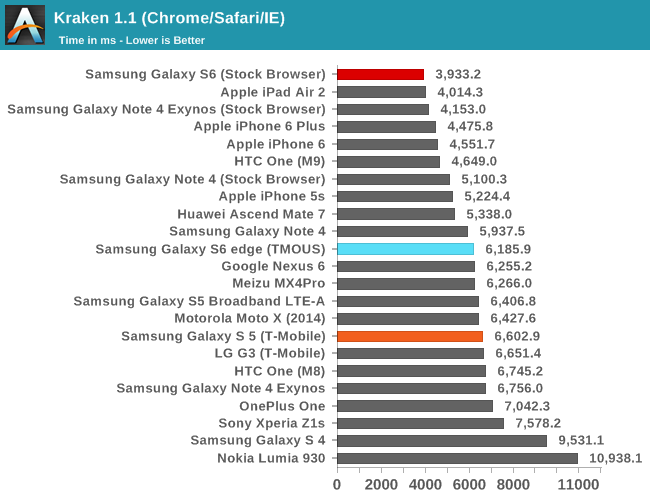
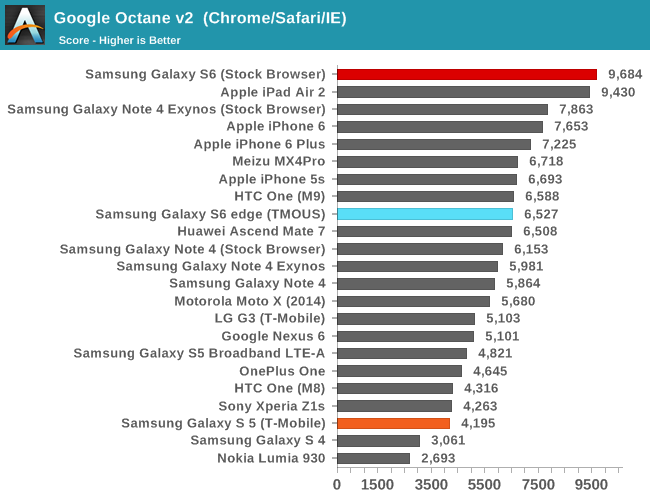
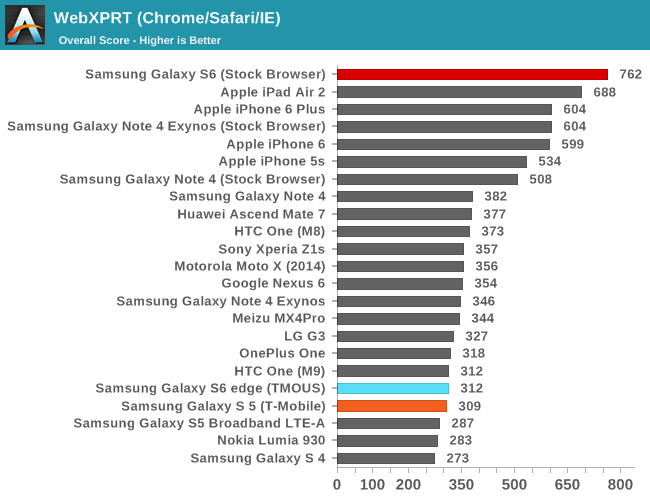
Needless to say, in order to see the full potential of the Exynos 7420 and its cluster of A57s, it’s necessary to use Samsung’s stock browser. This performance is really quite amazing when compared to Apple’s A8X, which has basically been the gold standard for performance in the mobile space in the context of ARM SoCs.
Moving on, as a part of our updates to the benchmark suite for 2015, we'll take a look at Basemark OS II 2.0, which should give a better picture of CPU performance in addition to overall device performance.
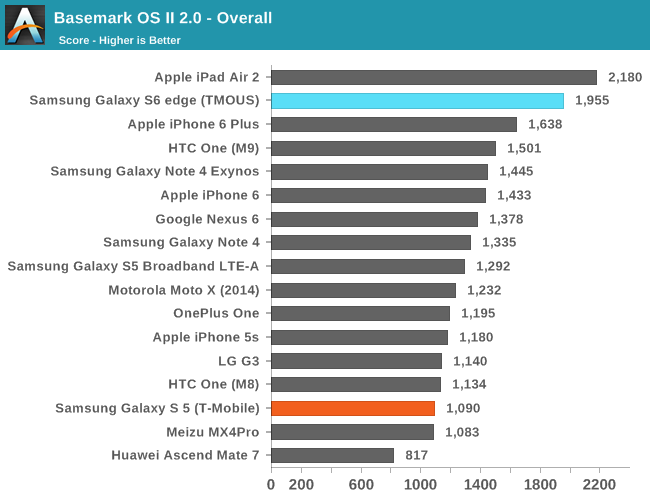
The browser benchmarks seem to hide some pretty enormous variability as the Galaxy S 6 edge (which is comparable to the Galaxy S 6) sets a new record among Android devices. The only challenger is the iPad Air 2, which uses the A8X SoC with three Enhanced Cyclone cores and the semi-custom GXA6850 GPU.
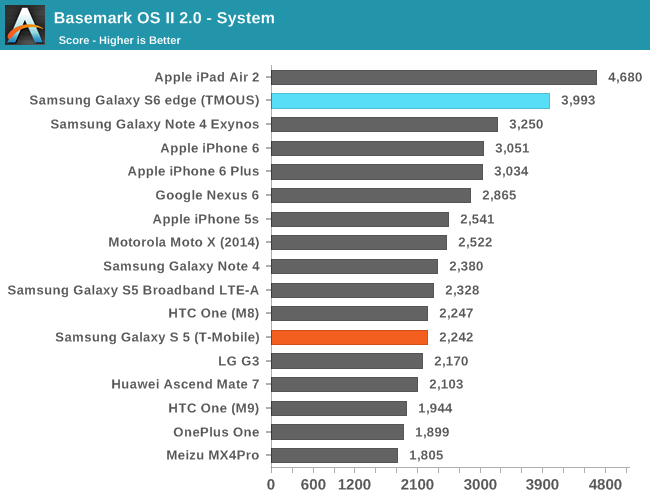
This system test contains a floating point and integer test, in addition XML parsing, which means that this test mostly stresses CPU and RAM. Interestingly enough, the Exynos 7420 pulls far ahead of both the Exynos 5433 and Snapdragon 810 in this test, and approaches the A8X. The difference between the 5433 and 7420 is likely a combination of the higher clocks on both the A57 and A53 clusters for the 7420 (1.9/1.3 on the 5433, 2.1/1.5 on the 7420), in addition to the ability to stay at a high 'overdrive' clock due to reduced leakage from the 14LPE process. The One M9 likely falls a bit short here due to HTC's governor settings restricting the use of all 8 cores simultaneously.
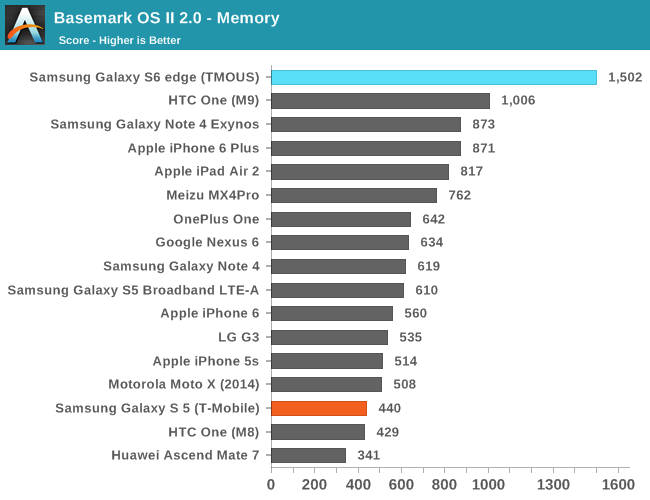
While one might guess that the memory test of 'Basemark OS II 2.0 - Memory' is of RAM, this is actually a test of the internal storage. Once again we see the S6 edge come close to leading the pack due to the use of the new UFS (Universal Flash Storage) standard. Casual examination reveals that the S6 edge has a queue depth of 16, and that it identifies itself with the rather cryptic model name of KLUBG4G1BD-E0B1.
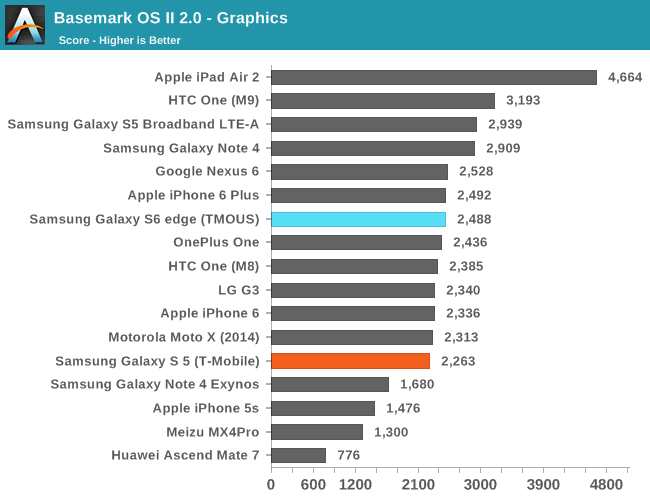
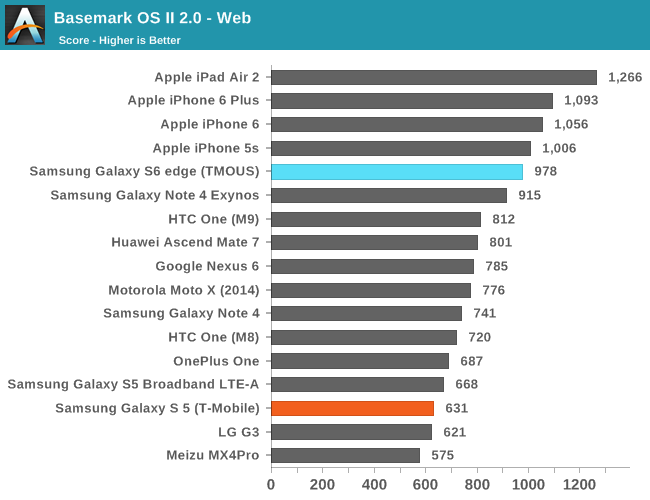
For the web test, it uses the built-in WebView rendering engine rather than Chrome and paints a distinctly different picture, especially because these tests are focused on HTML5 and CSS rather than JavaScript. Here we can see that the iPhone 6 and iPad Air 2 continue to hold their lead, but the Galaxy S6 is pretty much the king of the hill when it comes to Android devices.
Our next system benchmark is PCMark, which does a number of basic benchmarks designed to stress various aspects of the device in everyday workloads like video playback, web browsing, text editing, and photo editing. This tends to test every aspect of a mobile device, unlike microbenchmarks that can often miss aspects of the system that can affect performance.
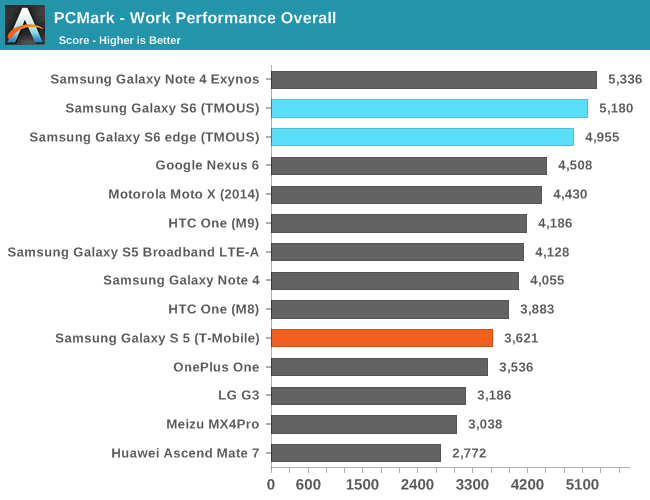
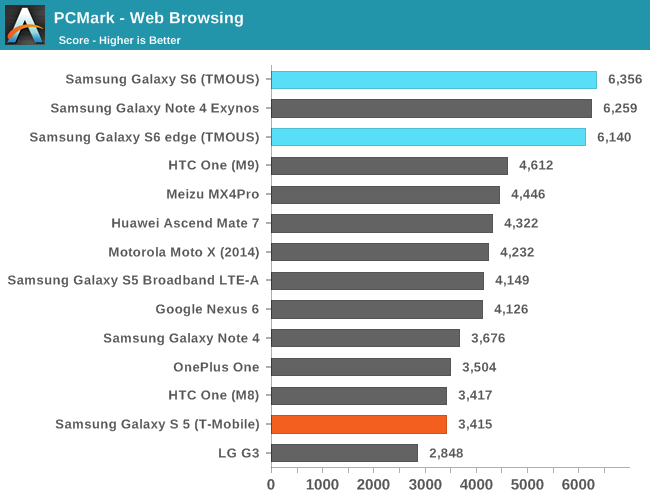
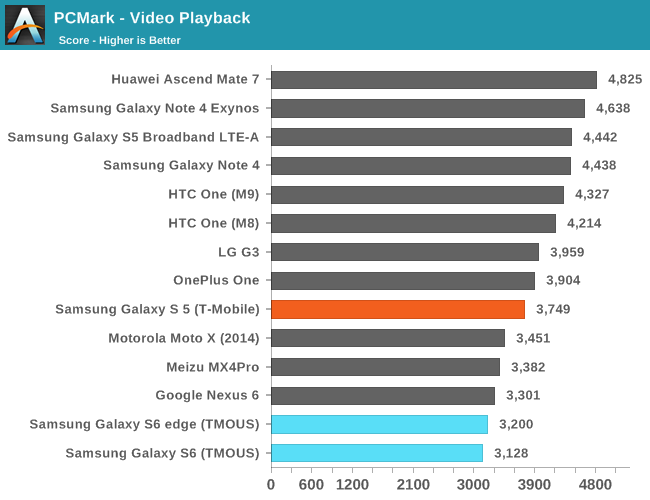
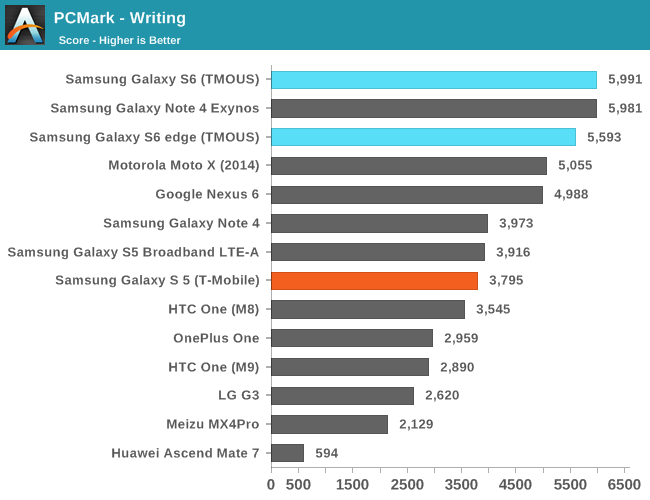
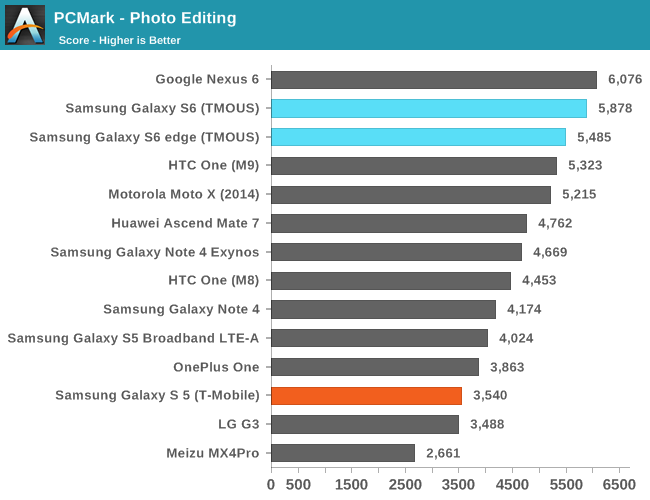
In these tests, the Galaxy S6 continues to perform strongly here due to the fast NAND storage solution and the Exynos 7420 SoC. As we have already covered the Basemark OS II 2.0 results in previous articles, I would refer back to it as those scores are final and have already been contextualized.
Overall, in these general purpose computing tasks that stress CPU, memory, and NAND performance we can see that the Exynos 7420 is off to a flying start. Samsung Mobile should focus more strongly on optimizing the software stack against Chrome as mobile Chrome has around twice the user share of stock Android browsers. I often say that the SoC is the foundation to a good smartphone, and in the case of the Galaxy S6 it feels like this is especially true.










306 Comments
View All Comments
chizow - Saturday, April 18, 2015 - link
Yep exactly, I spend enough time tweaking my PC and at least it provides me proper tools to do so. After a few months with the S4 I just realized it wasn't worth it as the awful battery life and bloats OS made me want to just keep it in my pocket for fear of running out of juice when I actually needed it for phone functions.akdj - Sunday, April 26, 2015 - link
I'm ambidextrous. Use the 6+(personally) & Note 4 (family business of two decades). To be fair with your assessment the iPhone 5 sucked battery just as quick as the S4. At the time, comparable flagships for six months. 5S remedied it with iOS 7, but nothing like iOS 8 and the 6+'s battery size. It's physics and I'm with ya, not arguing. Just my two cents as my Note 4 with 5.0.1 is nearly identical to my 6+ with iOS 8.3 at the end of a 14-16 hour work and family day with similar usage shows similar reserves. Easily 50%. Usually high sixtiesThe memory leaks of yesterday and more granular control of apps and their background abilities on Amdroid (and the new core framework of 5.0), it's distribution of RAM (compression) and raw speed of the NAND makes the new generations of Android feel like iOS. Seriously. It's rare I run into less than 60fps manipulating the UI. And I use third party launcher Nova or Google. Samsung's stock browser is now not only capable but 'fast' and the displays have come a really REALLY LONG way since your S4. They're cool. Stop in and play with the hiDPI models like the S6 and Note 4. The latter of which hauls ass. And looking at these results, the S6 smokes it!
Across the board! And like us iOS dorks, Android's finally got a 128GB on board storage option. I'm as die hard SD card user as there is. I've got a Samsung Pro micro SD that just came out, & it screams! Awesome to pack with media and the like. But then again, I had two choices. White or black. 32 or 32GB. Even the fastest 64GB CF cards are over $200 to get to ½ the speed the S6's internals are reading and writing. And removable storage is prone to failure by user fault than non accessible OEM supplied 'system' optimized storage.
This latest batch of iOS and Android flagships have seen a significant increase in the internal read/write performance. Anyone that used or is using HDDs and have switched to an SSD knows the difference in perceived speed. It's the same on a phone when they've increased as much as they managed to in the past two years.
Especially this round. Note 4. The iPhone 6/6+. And now the king, look at those speeds on the S6. Those are insane and with the faster SoC, RAM (DDR4) and 'storage' I just talked about, along with the lollipop update and it's corresponding (massive) energy savings I've seen makes these 'phones' over the past ten months faster than computers we were using just five years ago. With higher resolution displays. Faster internet than even possible in most places then, wired! & we're getting those speeds on LTE! Wireless cell speed, increased horsepower, refined OS and leaps and bounds of improvements to AMOLED technology have made for a really tough decision which platform to go with. I'm still partial to iOS but only because of its integration and aggregation with OS X, my OS of choice. While I also use Win 8.1 and enjoy it ...neither system welcomes my browser of choice for nearly a decade. Chrome. Now 'Google Apps' it 'takes over' your computer. OS X or Windows, slow as molasses and it's a resource hog! Never thought I'd see the day IE and Safari would be my first choice(s).
Sorry to ramble. Just a view from someone not as responsible as yourself (I've no self control and can't decide between which, so both) and having continued ownership of both platforms since you switched, I'm floored by the improvements to Android, and their associated flagships. The displays are unbelievable when watching movies. Just awesome. Hard to explain how immersive a flick is on a 1440p 5.7" display with a killer set of cans ;)
Onsager - Friday, April 17, 2015 - link
Well written article, however given the few negatives, and very notable benchmarks, I am surprised it didn't receive a 'recommended' badge. The Exynos 7420 Soc itself deserves an award. In fact, numerous statements in the article certainly distinguish this phone as the current class of the field. 'What's a phone gotta do...'halcyonmax - Friday, April 17, 2015 - link
couldn't agree more.gnx - Friday, April 17, 2015 - link
+1Peichen - Saturday, April 18, 2015 - link
Is it necessary? The conclusion already states this is the best Android phone out right now.Onsager - Saturday, April 18, 2015 - link
By that rationale, no awards are ever necessary.akdj - Sunday, April 26, 2015 - link
That's kinda what I concluded. Awards? Who GAS? Hey quite honestly says this is hands down the Android 'king of the hill' (my quote) several times. Camera. Check. Display check. SoC - Yep, Whole page devoted to it eating the rest of the field for lunch. The only silicon that competes with it right now is the A8, Apple's second generation 64bit bad ass.Kinda cool Sammy did what they did with Exynos when the SD810 heat/throttling came to light. Good for them but I think I must've read a different article than you. This isn't a site for trophies and ribbons. And you don't have to read between lines
He actually says this is the BEST Android on the market and perhaps best overall phone. There's areas iOS best Android and vice versa. It's tough to say ones better than the other with 'numbers' ratings or some sort of star system. Bette to say it with words as the author (Josh? I'm sorry bud. Too lazy to look;)) has dome. It's right above this section.
It's called
"Final Words"
Babios - Friday, April 17, 2015 - link
I just had a hands on with both phones for more that an hour. Nice performance but too expensive for android phones. I am disappointed from a 1000€ phone (no sd, single sim, single speaker) and I can not feel it as a premium for that price range.You can buy a cheaper android phone that can cover your needs 99% with the 1/3 of the “Edge” price. S6 can score 70000 in Antutu but mine with 40000 is super fast in every game - application I have used.
Apple became cheaper that Samsung thats the news !!!!
magreen - Friday, April 17, 2015 - link
"As a reminder, power scales quadratically with voltage, so a drop from 1287.50mV to 1056.25mV as seen in the worst bin 1.9GHz A57 frequency should for example result in a massive 48% drop in dynamic power."It's a 33% drop in dynamic power, isnt' it?
(1287.5^2 - 1056.25^2) / 1287.5^2 = 0.327.
(The 48% number would be how much more power the higher voltage part uses than the lower voltage part, which is not the power drop.)